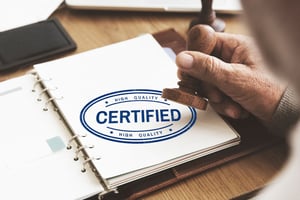ASI Food Safety, a trusted food safety partner since the 1940s and now part of Kiwa Group (since 2022), simplifies this process. ASI not only identifies the most relevant certifications for producers but also highlights overlaps between standards to prevent redundant audits—saving time and resources. With expanded offerings in 2024, ASI now provides access to globally recognized certifications, including FSSC 22000, BRCGS, and IFS Certification. Each certification serves specific purposes and markets, offering unique advantages for companies ranging from small businesses to large Fortune 500 corporations.
Key Certifications Offered and Their Benefits
1. FSSC 22000 Certification
What is FSSC 22000 Certification?
FSSC 22000 (Food Safety System Certification) is a Global Food Safety Initiative (GFSI) benchmarked certification focused on food safety management systems. It follows ISO standards (ISO 22003) and integrates seamlessly with other ISO management systems like ISO 9001 (quality management) or ISO 14000 (environmental management).
Unique Features and Benefits:
- Global Acceptance: Recognized internationally, particularly by major food corporations and manufacturers.
- Three-Year Validity: Unlike annual renewals, FSSC 22000 certifications are valid for three years, reducing the administrative burden.
- Scalability: Applicable across the entire food supply chain, including manufacturers, transporters, and retailers.
- Integration: Companies using multiple ISO standards can harmonize their systems for improved efficiency.
- Increasing Adoption: Over 36,000 sites worldwide are certified under FSSC 22000 (FSSC 22000 Annual Report, 2023).
Why It Matters for Companies:
Large corporations adopting FSSC 22000 benefit from its global credibility, standardized processes, and ability to integrate with existing management systems. This certification enhances supply chain transparency and supports regulatory compliance across international markets.
2. BRCGS Certification
What is BRCGS Certification?
The Brand Reputation Compliance Global Standards (BRCGS) certification, established in 1996, sets global benchmarks for food safety and quality. It covers various sectors, including food manufacturing, packaging materials, consumer goods, and storage/distribution.
Unique Features and Benefits:
- Global Recognition: Often required by retailers and stakeholders in food supply chains. Major grocery chains in the UK, USA, and Canada mandate BRCGS certification for suppliers.
- Operational Efficiency: Helps businesses streamline processes, reduce risks, and ensure compliance with regulatory standards.
- Sales and Profitability Impact: According to the BRCGS Compliance Report, manufacturers with this certification experience, on average:
- 7.5% sales growth
- 6% increase in profitability
- Continuous Improvement: BRCGS standards require ongoing assessment and improvements, fostering a culture of quality and safety.
Why It Matters for Companies:
For companies seeking to supply products to major retailers globally, BRCGS certification is often a non-negotiable requirement. It enhances brand reputation, builds consumer trust, and drives profitability by improving operational efficiency.
3. IFS Certification
What is IFS Certification?
The International Featured Standards (IFS) certification, established in 2002 by French and German retail associations, emphasizes food safety and product quality with a risk-based, non-prescriptive approach.
Unique Features and Benefits:
- European Market Access: IFS certification is widely accepted by European retailers. It is mandatory for North American companies looking to export food products to European markets.
- Customized Approach: The non-prescriptive methodology allows companies to design hazard control methods tailored to their unique operations.
- Efficiency and Standardization: Simplified processes and standardized assessments reduce operational redundancies.
- Growing Adoption in the U.S.: While IFS is predominantly European, its demand is steadily increasing in the United States due to growing cross-border trade.
Challenges and Solutions:
- Auditor Availability: In the United States, finding qualified auditors can be challenging, as only a handful of auditors are certified.
- Training Requirements: European regulations and requirements pose a steep learning curve. Only 25% of auditors pass IFS training in the U.S.
Why It Matters for Companies:
IFS certification is essential for North American businesses seeking to expand into European markets. It supports compliance with stringent European food safety regulations, enhances operational transparency, and improves global market competitiveness.
Why ASI and Kiwa Group Stand Out
Navigating the complexities of food safety certification can be overwhelming, particularly for companies with global supply chains. ASI, as part of Kiwa Group, simplifies this journey by offering expert guidance, audits, and training for FSSC 22000, BRCGS, and IFS certifications. Their unique value lies in:
- Expertise Across Markets: With decades of experience and an expanding team, ASI has positioned itself as a global leader in food safety solutions.
- Qualified Auditors: ASI has addressed the auditor scarcity challenge for IFS in the U.S., becoming one of the few certification bodies with qualified auditors readily available.
- Cost and Time Efficiency: By identifying overlaps between certifications, ASI helps companies avoid redundant audits, optimizing resources.
- Global Reach: Offering certifications across the U.S., Mexico, and Canada, ASI supports businesses of all sizes in achieving global compliance.
Get Assistance with Food Safety Certifications
Looking to get certified with FSSC 22000, BRCGS, or IFS? Let us help you!Conclusion: Driving Excellence in Food Safety
In an increasingly interconnected food supply chain, achieving and maintaining food safety certifications like FSSC 22000, BRCGS, and IFS is not just about compliance but about building trust, enhancing operational performance, and accessing global markets.
By partnering with ASI Food Safety and Kiwa Group, businesses can confidently navigate this complex landscape, ensuring they meet the highest standards in food safety and quality. Whether a small startup or a Fortune 500 enterprise, these certifications provide measurable benefits—boosting sales, increasing profitability, and improving global competitiveness.
Stay tuned as ASI continues to expand its services in 2025, empowering companies to uphold food safety excellence.
References:
FSSC 22000 Annual Report 2023. Retrieved from FSSC 22000 Official Website
BRCGS Compliance Report. (2023). Retrieved from BRCGS Official Website
International Featured Standards (IFS). Retrieved from IFS Certification
(This blog content was initially published on Kiwa's website--read the original post here.)
